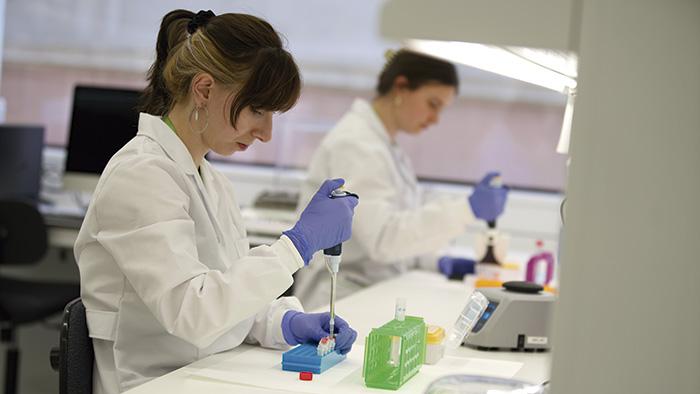17 Jun | 2024
First study to define minimum acceptable criteria for Alzheimer's blood biomarker testing

A group of expert researchers have defined for the first time the minimum acceptable performance of Alzheimer's biomarker tests in plasma for possible clinical use. The research conclusions, published in a consensus document in Nature Reviews Neurology, establish minimum parameters of sensitivity and specificity for the tests that use these biomarkers to evaluate the presence of amyloid pathology, associated with the neurodegeneration processes of Alzheimer's.
The research has been carried out by a working group convened by the Global CEO Initiative organization on Alzheimer's Disease. Dr. Marc Suárez-Calvet, head of the Research Group on Biomarkers in Fluids and Translational Neurology at the Barcelonaβeta Brain Research Center (BBRC), has been one of the experts selected to participate. “In recent years, several blood biomarkers for Alzheimer's have been developed, but the minimum requirements that these biomarkers must meet to be used in clinical practice have not been clearly defined. This consensus document defines these criteria and serves as a guide for the future development and validation of new biomarkers,” explains the researcher.
Given the recent approval in several countries of the first anti-amyloid treatments to treat Alzheimer's, confirming the presence of amyloid pathology is key to identifying candidates to receive these treatments. Biomarkers in plasma, detectable from a blood test, constitute a more economical and less invasive tool for the diagnosis of the pathology than tests currently used such as amyloid positron emission tomography (PET) or lumbar puncture to extract cerebrospinal fluid. In this sense, blood biomarker tests that follow the accuracy standards established in this publication could allow more people to receive a careful and early diagnosis of Alzheimer's and potentially benefit from new anti-amyloid treatments.
The study concludes that blood biomarker tests should have a sensitivity of ≥90% and a specificity of ≥85% for screening people at risk of having amyloid pathology in primary care, and a slightly lower specificity (≥75- 85%) for secondary care screening in centers with high capacity to perform follow-up amyloid PET testing or lumbar punctures. For confirmation of amyloid pathology, the performance of blood biomarker tests would have to have a sensitivity and specificity of around 90%, equivalent to that of cerebrospinal fluid tests approved by the Food and Drug Administration (FDA).
Reference
Schindler SE, Galasko D, Pereira AC, Rabinovici GD, Salloway S, Suárez-Calvet M, Khachaturian AS, Mielke MM, Udeh-Momoh C, Weiss J, Batrla R, Bozeat S, Dwyer JR, Holzapfel D, Jones DR, Murray JF, Partrick KA, Scholler E, Vradenburg G, Young D, Algeciras-Schimnich A, Aubrecht J, Braunstein JB, Hendrix J, Hu YH, Mattke S, Monane M, Reilly D, Somers E, Teunissen CE, Shobin E, Vanderstichele H, Weiner MW, Wilson D, Hansson O. Acceptable performance of blood biomarker tests of amyloid pathology - recommendations from the Global CEO Initiative on Alzheimer's Disease. Nat Rev Neurol. 2024 Jun 12. doi: 10.1038/s41582-024-00977-5.









